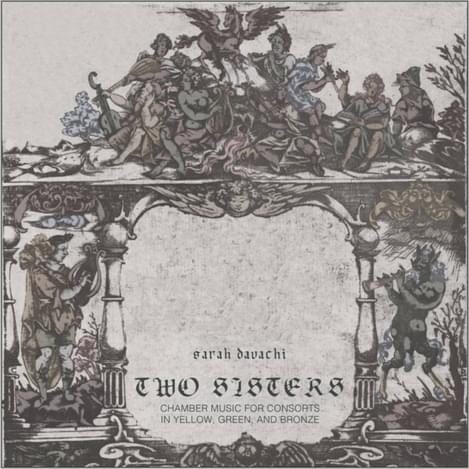Sarah Davachi excellently binds music's past and future together on Two Sisters
"Two Sisters"

The breadth of Sarah Davachi’s musical imagination is evident on the tracks on Two Sisters.
Rather modestly, she refers to these as 'Chamber Music', and although they are rooted in classical forms, they demonstrate a variety of approaches – often ingeniously using traditional sonics to create striking contemporary effects such as tape delay achieved through offsetting voices leading to impressive counterpoint sounds. This remarkable mix of old and new, from a four-voice choir work based on a medieval piece to a highly unusual tuning for four trumpets, illustrates her talent over an impressive range.
It’s a project ambitious in the extreme, but one that is consistently engaging, with some delightful subtleties and nuances that require no academic musical knowledge to appreciate and enjoy. A good example is the opening track, “Hall of Mirrors” for carillon bells and electric organ. Slow, meditative with an almost sepulchral atmosphere, its resonance is extraordinary and affecting.
We then move back to the medieval period for “Alas, Departing”, based on a lament from the 1400s. Two voices are layered to create the effect of four. It’s a stark and beautiful track, with a secular text deliberately used in an arrangement most often heard in pre-Reformation masses; a decidedly modern creation, as if Steve Reich were transported back to the age of Henry IV. We often associate drone-based music with contemporary composition, but Davachi sustains the sound of a baroque organ with an unusual valve system that allows for some hypnotically-gentle tonal shifts, to produce a piece strikingly modern.
The solo organ pieces (“Harmonies in Green” and “Harmonies in Bronze”) were recorded in a Belgian church, and highlight what a wondrous effect the reverberative context can contribute. The overlap of chords here produces a sense of being enveloped in waves of sound as the tracks evolve slowly and powerfully. Again, one senses the ancient and the modern simultaneously: a feature characteristic of Davachi’s work across her catalogue.
Two quartets, one with the addition of woodwind and drone, show her using a standard western format and taking it in a twenty-first century direction. “Icon Studies I” uses some unusual modes of scales (such as repeated notes within an octave) resulting in something both recognisable and yet strangely disorientating. Inviting close attention, it’s nevertheless far from merely an academic exercise.
“Icon Studies II” has more orthodox quartet forces (two violins, viola, cello) but with a tuning based on a Middle Ages system; and, again, it’s fascinating to hear something that suggests the medieval and the modern in its long phrasing. It has the immersive qualities of sacred pre-Renaissance and contemporary ambient music.
Overall, this is an album that makes so much of the distant past and the present through intelligent working with and against classical music conventions. Recommended to anyone wanting to experience a beautiful and evocative soundscape created out of a highly original sensibility.
Get the Best Fit take on the week in music direct to your inbox every Friday

Lorde
Virgin

OSKA
Refined Believer

Tropical F*ck Storm
Fairyland Codex





